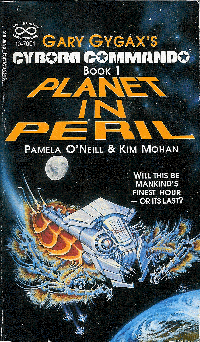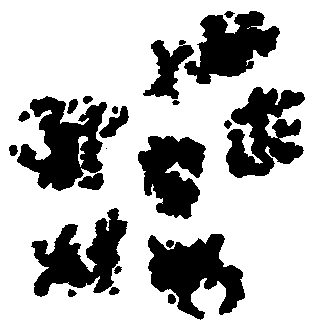As far as Z-grade RPGs go, Spawn of Fashan has loads of old-school credibility. Fashan was reviled a decade before Synnibarr went to print. Even without the benefit of the internet, SoF wormed its way into the consciousness of the gaming community has a prefect example of What Not To Do. Lawrence Schick (author of, among other things, the indispensable rpg reference book Heroic Worlds) made Fashan (in)famous in a Dragon magazine review "Don't take Spawn of Fashan seriously" (Dragon #60, April 1982). In this article Mr. Schick basically takes the tack that SoF is so bad that it -must- be an intentional parody of everything wrong with fantasy role-playing games. If only that were true.
It wasn't until a few years ago, when I read Roger Wilcox's review on RPGnet, that I started to appreciate some of the good points of Spawn of Fashan. Yes, there are good points even in this, one of the all-time most ridiculed RPGs. At this point I probably don't need to tell you that SoF is a fantasy rpg with levels and classes. And you probably wouldn't be surprised to hear that, overall, the game mechanics are clumsy and poorly organized. Still, there seem to be at least two mechanics in game that merit a second look.
First off, Roger Wilcox acknowledges one sharp idea in Fashan, the level-up mechanics. Allow me to quote from Mr. Wilcox's review:
What's truly amazing about this 1981 game system, though, is that gaining a level does not automatically give you such things as increased to-hit chances, increased saving throws, more powerful abilities for your character-type, etc.. Instead, gaining a level gives you a chance to raise your statistics. It is your statistics -- strength, dexterity, reflexes, constitution, courage, senses, etc. -- that determine your ability to attack enemies, survive engagements, acquire languages and special abilities, etc.. E.g., your to-hit bonus is based entirely on your dexterity and courage, and does not derive from your level at all. Your basic saving roll modifier, likewise, derives entirely from your intelligence and courage, not from your level.I really am starting to believe that even the worst rpgs (except maybe the big three) have at least one good idea.
Basically, although this is a class/level system, its mechanics are characteristic based rather than experience-level based, and I have to applaud them for that. It's a concept we Champions/HERO System players are well familiar with, but which was virtually unknown by most AD&D-like role-playing games 20 years ago.
The second mechanic I want to bring up is discussed and dismissed by both Wilcox and Schick: the combat system. The combat system is unwieldy in the extreme; this I do not deny. There are several times where the same roll has to be made mutliple times in a row before moving on to the next step of the cumbersome combat sequence. There's a lot of stuff to be looked up on poor organized tables. All in all, it's a ponderously slow combat system, as Wolcox's heroic attempt at a solo playtest makes clear.
To this criticism I must say, "So what?" People play rpgs with amazingly slow combat systems all the frickin' time. I personally have been to more than one session of Champions in which a single fight took up the majority of a 6+ hour session. Total elapsed game time was certainly less than five minutes of fighting. If the SoF combat rules were edited for clarity and then given some computer assistance, they may in fact kick ass. I don't know. My point is that some earlier game systems aren't as broken as they seem when modern computing power can be brought to bear.
Finally, I want to call attention to the setting material. Unlike most games nowadays, a lot of rpgs back then came with "sample" settings that weren't as inextricably hardwired into the game as in many post-Vampire rpgs. These sample settings were sketchy and could usually be completely ignored without any real difficulty. For example, the '81 Dungeons & Dragons Expert rules came with a map and brief description of the Grand Duchy of Karameikos. The game ran fine without using the Grand Duchy. Heck, many D&D adventure modules came with very scant setting material so that they could be dropped into any typical swords-and-orcs type of campaign.
(Two modern examples of the sample setting design ethos can be found in Eden Studios' Terra Primate and All Flesh Must Be Eaten rpgs. Eden goes one step further and offers multiple sample settings for both its ape and zombie games. Off the top of my head, Boot Hill is about the only old school rpg I can think of that does that, with its "quasi-hostorical" and "fictional" versions of Promise City.)
Spawn of Fashan has a sample setting in its own particular idiom: "Boosboodle, a land just south of where Melvin is standing now." I am not making this up. Apparently, the little map even has an arrow pointing towards the top of the page indicating how to get to the enigmatic Melvin.
What can I say? I can't help but fall in love with a dorky little setting like that. Knowing virtually nothing but the name of the realm and the Melvin joke, I find myself irrestibly drawn towards Boosboodle. I want to trounce around Boosboodle, stirring up trouble and brawling with the local misfits. Sure, Boosboodle is not in the calibre of setting material to which I normally feel this attraction. The lands south of Melvin are no Tekumel or Glorantha or Jorune or Harn, but they may be somewhere near the league of The Fantasy Trip's Cidri or Bard Games' Atlantis or the pre-Gazetteer Karameikos. I don't think I'd ever use Fashan's rules, but I would be reluctant to pass up a chance to strap on a sword and see the sights of Boosboodle.
On last quote from Mr. Wilcox:
And always remember the last words in the rulebook:
How many Boosboodles are there in your life?
Posted by jrients
at 3:38 PM CDT
Updated: Thursday, 3 June 2004 5:29 PM CDT


